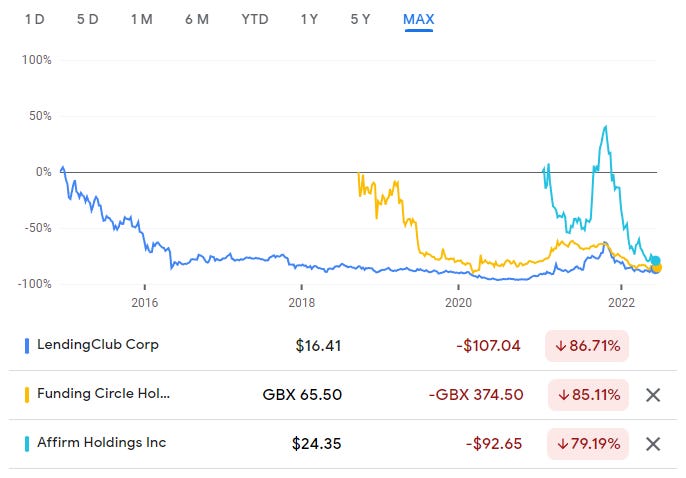Gm Fintech Architects —
Today we are looking into three overarching thematics over the last several months:
Digital banks, lenders, wealth, and brokerages stop defying gravity
Big Tech continues awkward flirtation with Finance, with strength in payments and infrastructure
Crypto splinters into Web3 DAOs culture and scalability architecture, destroying most app valuations
Thanks for your time and attention. If you have ideas for companies or topics to cover next week, let us know by clicking the button below.
Q2 2022 in Review
(1) Digital banks, lenders, wealth, and brokerages stop defying gravity
Whether you focus on neobanks, paytech, roboadvisors, or digital brokers, pretty much any B2C fintech company has hit the wall over the last six months. We don’t want to celebrate or dote on negative news, but there are some points that require repetition. In the very beginning of the year, we pointed to disconnect emerging between private market valuations and public market realities. It is worth reviewing.
The simplest framing of the issues that we saw was that venture capital was looking at financial revenues with hunger — seeing them as *better* than, or at worst equivalent to, SaaS and enterprise startups. In some ways this is true, since money-at-rest revenues (i.e., AUM-based, or deposit net interest) are recurring, money-in-motion revenues look like endless flows on economic activity (i.e., spread on payments brokerage), and risk-based revenues seem “solved” with better technology like machine learning (i.e., underwriting in lending or insurance).
On top of that, various freemium and reorganized business models emerged; hiding fees with market makers (Robinhood), collapsing wealth management fees to almost zero while making spread on cash sweep (Schwab), giving away deposit accounts while charging interchange on cards (Chime), putting fixed subscriptions on low credit users (Dave, Acorns), and so on. This looks like a better business model to a venture investor, but not to a banks analyst.
And therefore you have digital lending down 80%+,
and insurtech down 80%+,
and neobanks down 60%+,
and neobrokers down 80%+,
and paytech down 50%+,
Even the older style core banking and portfolio management players, who have an industry monopoly of tech on top of human intermediated bank and investment management distribution are hurting 20%+,
If you want to understand why, check out our short takes on fintech multiples from a few weeks ago here. The core answer is that there is a (1) minor decrease in potential operating performance, (2) a major, major decrease in value ascribed to future revenue, down from 30x to 3x, and (3) macroeconomic headwinds that are causing the systemic repricing of all growth, momentum, and risk assets.
All this pressure has resulted in the following outcome across several category leaders, with at least 10,000 jobs lost in the late stage Fintech / DeFi industries, and likely many more in the earlier stage companies we don’t get to read about.
So what should we do? Hide under the bed forever and never believe entrepreneurs again? We are no Cathie Wood — a goal to strive for perhaps — see our analysis of the ARK thesis here. But we are pragmatic futurists that believe in progressive technological expansion, increasing human productivity, the creative function of capitalism, and the value of novelty search.









